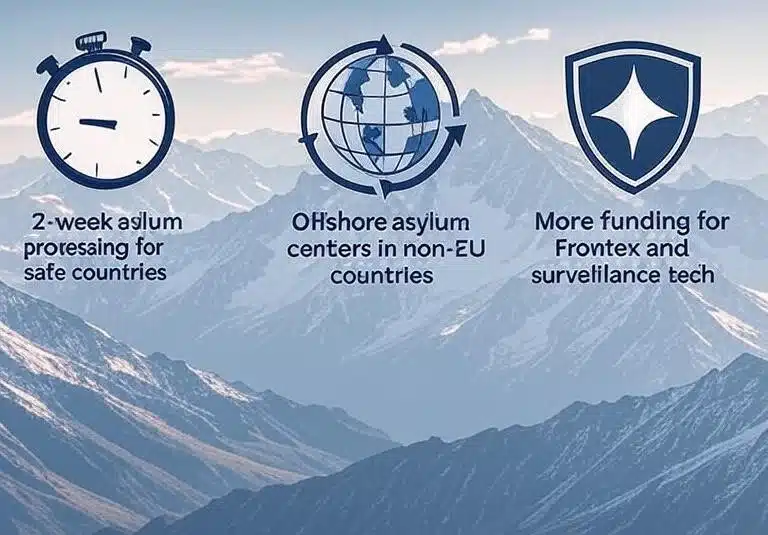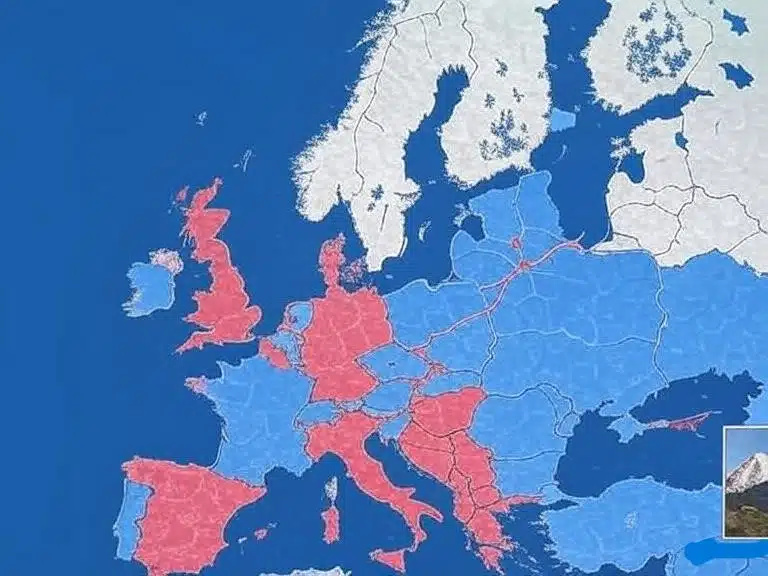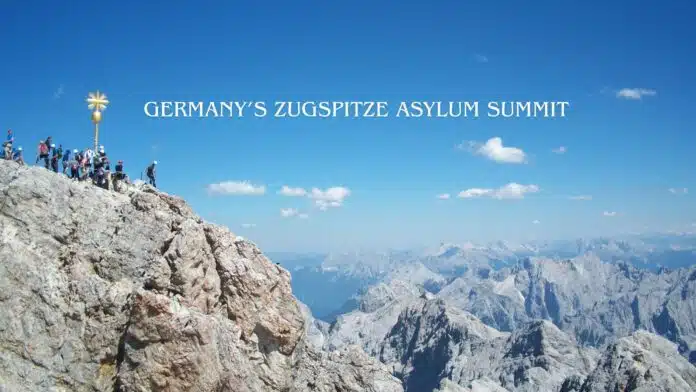
In July 2025, Europe’s leaders gathered on Germany’s highest mountain, the Zugspitze, to confront one of the EU’s most pressing challenges: migration, culminating in the Zugspitze Asylum Summit. Against a dramatic Alpine backdrop, interior ministers from across the bloc met for a high-stakes summit hosted by Germany.
The setting was symbolic, but the stakes were real. The summit’s decisions could soon shape how borders are enforced, how asylum is processed, and how EU countries, including Germany, handle newcomers.
For expats living in Germany or planning a move, these changes may touch everything from visa systems to how local communities perceive migration. While the focus was on asylum seekers, the ripple effects could be wider, affecting residency policies, integration efforts, and even social cohesion.
So, what exactly happened on the mountain? And what does it mean for the international community living in Germany today?
Summary of Zugspitze Outcomes
At the Zugspitze Asylum Summit, EU leaders agreed on several major changes to how the bloc handles asylum and migration. The measures mark a sharp shift in strategy, focusing on speed, control, and external processing.
Here’s what was decided:
- Faster Deportations: Asylum claims from people arriving from “safe countries” will be processed in as little as two weeks. Those from high-risk nations like Afghanistan and Syria may also face quicker deportation timelines, despite ongoing safety concerns.
- External Repatriation Centers: The EU will begin partnering with non-EU countries to host offshore facilities where asylum claims can be submitted and reviewed before individuals reach Europe. This means some migrants may never set foot in the EU during the asylum process.
- Stronger Border Enforcement: More money and staff will be directed to border protection agencies like Frontex. Surveillance tech, including drones and smart fencing, will be expanded at key entry points.
These changes aim to reduce irregular arrivals and speed up decisions, but they also raise questions about fairness, human rights, and the impact on EU society, including its international residents.
Impacts on Expats
While the summit’s focus was on asylum seekers, the policy shift could ripple into the lives of expats already living in, or planning to move to, Germany.
Here’s how:
- Visa Applications and Renewals
As immigration authorities come under pressure to act faster and toughly, expats might face longer waits or more scrutiny when applying for or renewing residence permits. Stricter background checks or shifting priorities could slow down once routine processes. - Family Reunification
Tighter rules on migration could also affect family reunification. Bringing a spouse, child, or parent to join you in Germany might involve more paperwork, longer timelines, or even rejection in cases deemed “non-urgent” under evolving policy. - Public Perception and Integration
A harder political tone can influence public attitudes. Expats may notice increased social tension or subtle shifts in how foreigners are viewed, especially in workplaces, housing markets, or schools. While many communities remain welcoming, heightened debate around migration can create a less predictable environment.
These changes don’t mean expats aren’t welcome, but they do suggest that navigating German bureaucracy, social systems, and public opinion may get more complex. Being informed is the first step toward staying prepared.
Contextual Background
To understand the Zugspitze decisions, it helps to look at what’s shaping policy behind the scenes, both in Germany and across Europe.
- Germany Under Chancellor Merz
Since taking office in late 2024, Chancellor Friedrich Merz has taken a firmer stance on migration. Promising “order and control,” his government has prioritized faster deportations and stricter border policies. The Zugspitze summit reflects that direction, pragmatic to some, controversial to others. - Pressure from the AfD
The far-right Alternative für Germany (AfD) party has seen a rise in support, especially in eastern states. While not in government, its rhetoric has pushed mainstream parties to act tougher on migration. Many analysts see the Zugspitze policies as a political response to this growing pressure. - A Shift Across the EU
Germany isn’t alone. Other EU countries, including Austria, Denmark, and Italy, are also calling for more control at the borders and quicker removals. The idea of offshore processing, once considered extreme, is now gaining traction across the bloc.
In short, Chancellor Merz’s hardline approach, fueled by AfD pressure, aligns with an EU-wide push to tighten migration. For expats, that means understanding not just the rules, but the politics behind them.

Migration by the Numbers
Here are key figures that bring the migration backdrop into sharper focus, providing crucial context for expats following the Zugspitze Summit.
Asylum Applications & Deportations
- In 2024, Germany received about 229,750 first-time asylum applications, a 30% drop from 2023.Asylum Info DatabaseOSW Ośrodek Studiów Wschodnich
- Deportations surged in early 2025: 6,151 expulsions occurred in just the first quarter, a notable increase over previous years.InfoMigrants
Slump in Asylum Numbers, and a Record Low on the Horizon
- Between January and July 2025, the first half of the year, initial asylum applications halved, from approximately 140,800 to just 70,000.The Times
- The government expects a total of around 100,000 asylum applications in 2025, the lowest level in over a decade. Reuters
Economic Role of Migrants
- Germany, long a top destination for immigrants, now has around 20% of its population as first-generation immigrants. Wikipedia
- First-generation migrants deliver a positive net fiscal impact, even after accounting for taxes and public services, largely thanks to a younger, working-age demographic. Marginal REVOLUTION
Why these numbers matter to expats:
- Faster deportations and fewer asylum claims reflect a broader trend of stricter migration enforcement.
- Despite tougher policies, migrants continue to contribute significantly, benefiting Germany’s economy and workforce.
- For expats, these stats signal a changing political climate and point to the importance of staying informed on administrative shifts.
These figures make clear that migration policy isn’t just a theoretical debate; it’s shaping Germany’s social fabric in real time.
Practical Guidance for Expats
The Zugspitze summit may have set a new tone for EU migration policy, but for expats, staying informed and prepared is the best way to adapt. Here are some simple, actionable steps to keep you on solid ground:
Stay Updated
Keep an eye on official websites for the latest changes to immigration and residency policies:
- BAMF (Federal Office for Migration and Refugees): www.bamf.de
- European Commission Migration Portal: ec. europa.eu/migration
Set alerts or check monthly, especially if you’re planning a move, renewing a visa, or applying for reunification.
Organize Your Documents
Make sure your residence permit, work visa, health insurance, and rental contracts are valid and accessible.
Scan copies and store them securely, both physically and digitally. Delays or rejections often stem from missing paperwork.
Get Help If Needed
If you’re facing visa issues, delays, or unexpected rule changes:
- Reach out to a certified immigration lawyer for guidance.
- Join local expat or migrant support groups; many offer advice in English and have up-to-date info.
- Contact your embassy in Germany for support or referrals.
Connect with Community
From local Facebook groups to intercultural meetups, staying socially connected can help you share resources, ask questions, and feel less alone when navigating bureaucracy.
Bottom line:
Monitor BAMF for updates, double-check your documents, and don’t hesitate to seek help. Staying proactive and informed is the best way to thrive, no matter how the rules evolve.
Conclusion
The Zugspitze Asylum Summit marks a turning point in Germany’s migration approach, and while the focus was on asylum seekers, the ripple effects may reach many corners of expat life.
Leaders agreed to speed up deportations, set up repatriation centers outside the EU, and tighten border enforcement. These shifts, driven by political pressure and wider EU trends, could mean stricter visa processes, delays in family reunification, and evolving public sentiment.
For expats, the message is clear: stay proactive. Keep your documents in order, check trusted sources like BAMF for updates, and don’t hesitate to seek legal or community support if needed.
Germany may be entering a new chapter, but with the right awareness and preparation, expats can continue to live, work, and thrive here with confidence.


